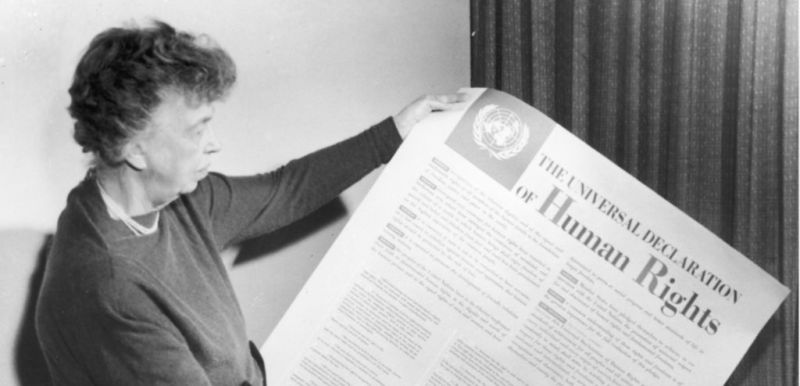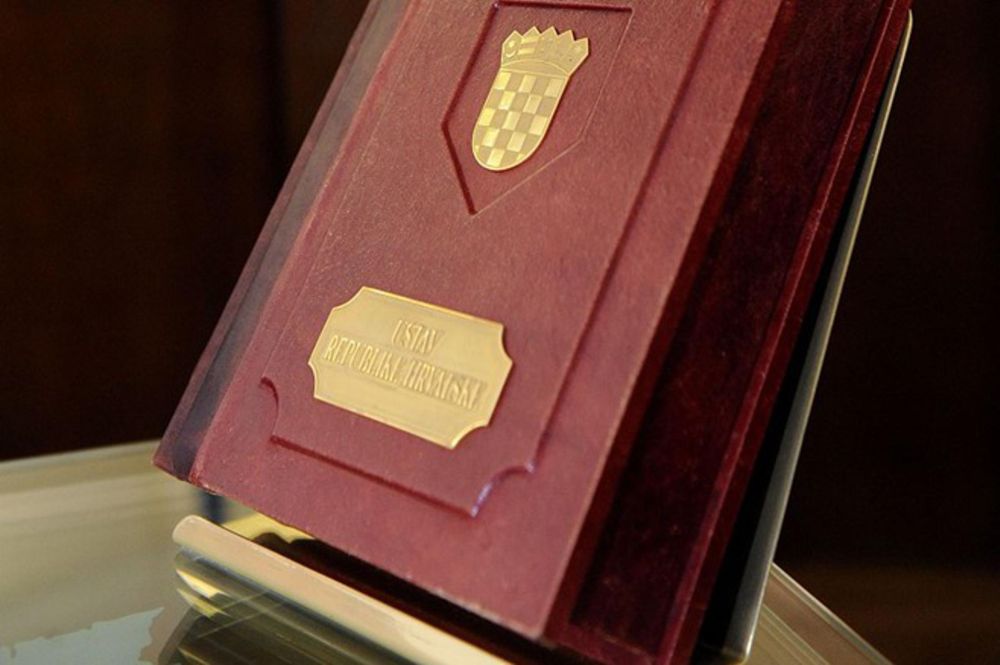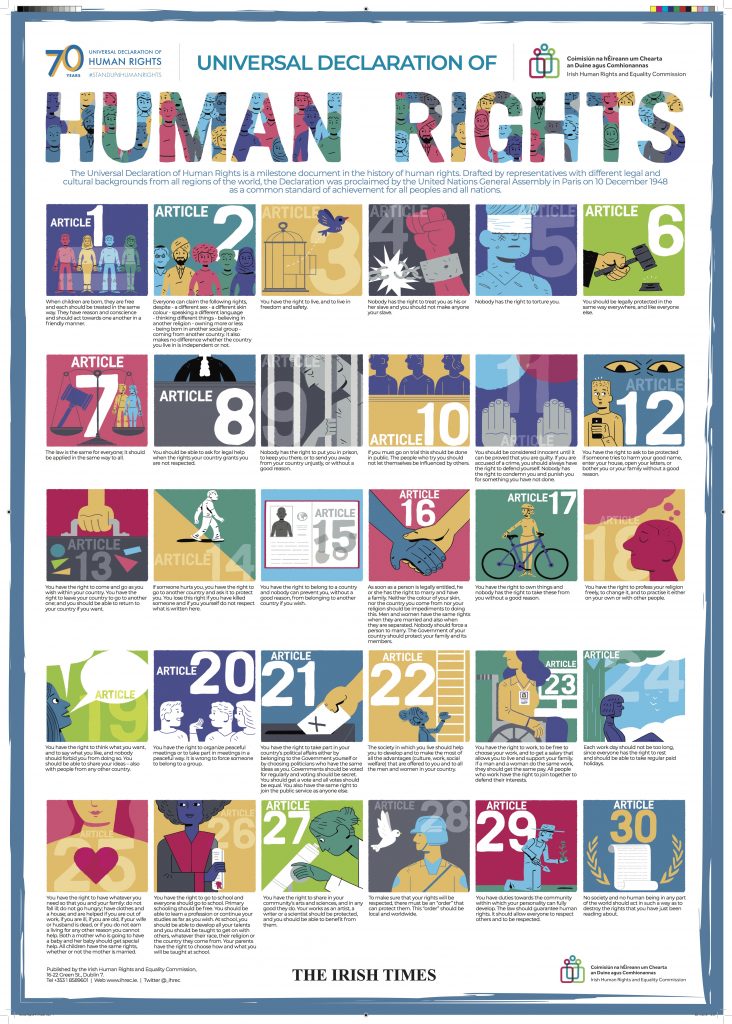Zašto su važna ljudska prava?

Ljudska prava su nešto o čemu ne razmišljamo previše, osim ako nam nisu uskraćena/ugrožena.
Većina nas nije niti svjesna koja sve prava uživa, a koja nisu omogućena mnogim ljudima diljem svijeta – jer kad razmišljamo o ljudskim pravima, ne smijemo gledati samo ispred svog praga, već baciti oko i na susjedovo dvorište da se uvjerimo kako on živi.
A susjedovo dvorište je, u ovom slučaju, cijeli svijet.
- Možete li kao žena slobodno donositi odluke o svojem obrazovanju ili druge važne odluke? U Saudijskoj Arabiji svaka žena mora i dalje imati muškog skrbnika koji će važne odluke donositi u njezino ime. Tek odnedavno, ženama je dozvoljeno da voze i da putuju!
- Bojite li se da će vas netko optužiti da ste vještica? U Indiji je, prema podacima Državnog ureda za evidenciju zločina, u 2016. zabilježeno 134 slučaja ubojstava povezanih s lovom na vještice.
- Razmišljate li ikad o genitalnom sakaćenju? Vjerojatno ne, dok je u Ugandi povećan broj slučajeva genitalnog sakaćenja nad djevojčicama. Prema procjenama UN-a, oko 200 milijuna djevojčica i žena širom svijeta prošlo je kroz genitalno sakaćenje, što obično uključuje djelomično ili potpuno uklanjanje vanjskih genitalija.
- Ako se smatrate aktivistom/kinjom, strahujete li za vlastiti život? Ujedinjeni narodi izvješćuju o preko 400 ubojstva aktivista/kinja za ljudska prava u 2022. te navode 38 zemalja za koje kažu da progone aktiviste i aktivistkinje za ljudska prava. Među 38 država spomenutih u izvješću nalaze se Rusija, Kina, Mađarska, Kolumbija, Kuba, Egipat, Indija, Izrael, Mjanmar, Saudijska Arabija, Turska i Venezuela.
- Živite li u državi u kojoj ste rođeni, bez straha da će vas sutra netko natjerati da iz nje odete? Unazad nekoliko godina svjedoci smo da to nije realnost mnogih migranata i migrantkinja koji/e su morali prisilno napustiti svoje domove i pobjeći u nesigurnu budućnost.
- Koliko se, kao žena, osjećate sigurno u svojoj državi? Ako ne živite u Indiji, Afganistanu, Siriji, Somaliji i Saudijskoj Arabiji možete se smatrati sretnicom – ovo su zemlje koje su najopasnije zemlje u svijetu za žene.
- Strahujete li da ćete postati žrtvom modernog ropstva? Vlasti u Velikoj Britaniji procijenile su da je najmanje 13.000 ljudi diljem Velike Britanije bilo žrtvama prisilnog rada, seksualnog iskorištavanja i služenja, no policija navodi kako bi pravi broj mogao biti u desecima tisuća, uz porast broja takvih slučajeva.
- Kolike su vaše šanse da postanete beskućnik/ica? Prema izvještaju organizacije FEANTSA (Europska mreža za beskućništvo) i francuske Zaklade Abbé Pierre, za 2018. godinu, beskućništvo je u Europi poraslo za 150 posto u Njemačkoj, 145 posto u Irskoj i gotovo 100 posto u Belgiji.
- Smijete li se udati za osobu koju sami odaberete? U mnogim zemljama i dalje je uobičajena praksa dogovorenih brakova u kojima žene nemaju nikakvo pravo glasa.
- Možete li se s partnerom/icom na javnom mjestu zagrliti, držati za ruke ili poljubiti, a da vas okolina ne osuđuje i da ne doživite nasilje? Osobe istospolne orijentacije suočavaju se s diskriminacijom, govorom mržnje i nasiljem te se radi toga događa da se ne osjećaju sigurno u javnosti pokazivati osjećaje. Prema istraživanju u Hrvatskoj iz 2020.g. više od 80% osoba se boji držati za ruke u javnosti, skoro svaka druga osoba se suočila s diskriminacijom u posljednjih 12 mjeseci a 64% ispitanih je doživjelo nasilje.
- Možete li se prijaviti za posao i računati na to da ćete dobiti posao u skladu sa svojim kvalifikacijama i kompetencijama? Žene, transrodne osobe, Romi često se suočavaju s diskriminacijom pri zapošljavanju i krše se njihova radna prava.
- Je li vam dostupno obrazovanje, pristup zdravstvenoj njezi, pravo na rad, pravo na prekid trudnoće, pravo izlaska na izbore, pravo na slobodno udruživanje, iznošenje vlastitih stavova u javnom prostoru, pravo na slobodno raspolaganje vlastitim financijama?! Riječ je o pravima koja nisu omogućena mnogim osobama diljem svijeta! I dok Hrvatska, nažalost, sve više skreće u pogrešnom smjeru, danas je više nego ikad važno osvijestiti prava koja imamo i boriti se da ih ne izgubimo.
Temeljna ljudska prava i povelje
Iako imaju svoje korijene daleko u povijesti čovječanstva, ljudska prava kakvima ih danas poznajemo, koja pripadaju svakom čovjeku od trenutka rođenja, prvi put su proglašena od strane Ujedinjenih naroda.
Strašni zločini počinjeni tijekom Drugog svjetskog rata naglasili su goruću potrebu da se zaštite osnovna ljudska prava ljudi diljem svijeta koja ne smiju biti prekršena niti od državnih vlasti kako se strahote Drugog svjetskog rata ne bi nikada ponovile.

Međunarodna zajednica je stoga osnovala Ujedinjene narode te se u Povelji UN-a obvezala da ljudska prava nisu regulirana i nadzirana samo od strane pojedinih država, već postaju pitanje zajednice država. No, bilo je potrebno utvrditi što su točno ljudska prava i što se pod njima podrazumijeva.
Stoga je 10. prosinca 1948. godine donesena Opća deklaracija o ljudskim pravima koja proklamira po prvi puta u povijesti ‘katalog ljudskih prava’ koja su nedjeljiva i univerzalna. U svojih 30 članaka Deklaracija objavljuje niz političkih, građanskih, socijalnih, ekonomskih i kulturnih prava. Iako je ovo bio veliki napredak, ova Deklaracija nije (bila) pravno obvezujuća.
Kako bi se osigurala provedba i bolja pravna zaštita, donesena su dva pravno obvezujuća pakta: Međunarodni pakt o građanskim i političkim pravima s Fakultativnim Protokolima i Međunarodni pakt o gospodarskim, socijalnim i kulturnim pravima.
Oba su pakta stupila na snagu 1976. godine nakon dovoljnog broja ratifikacija.
Uz ove dokumente općeg karaktera, Ujedinjeni narodi su usvojili vise od 20 konvencija koje elaboriraju ljudska prava, vezano uz određene skupine ljudi ili prava. One uključuju Konvenciju protiv mučenja i drugih okrutnih, neljudskih ili ponižavajućih postupaka i kažnjavanja, Konvenciju o sprečavanju i kažnjavanju zločina genocida, Konvenciju o statusu izbjeglica, Konvenciju o ukidanju svih oblika diskriminacije nad ženama, Konvenciju o pravima djeteta.
Uz institucije i povelje UN-a, stvoreni su i regionalni sistemi s ciljem snažnije zaštite ljudskih prava. Iako je bilo pokušaja i u Aziji i Bliskom istoku, izgrađeni mehanizmi primjenjivi na regionalnoj razini su europski, afrički i inter-američki sistem.
Vijeće Europe, međunarodna organizacija 47 država članica šire europske regije, osnovana je 1949. godine. Članice Vijeća Europe donijele su Europsku Konvenciju za zaštitu ljudskih prava i temeljnih sloboda. Konvencija je usvojena 1950. godine, a stupila je na snagu 1953.
Hrvatska je Konvenciju i njene protokole ratificirala 5. studenoga 1997. godine. Konvencijom je ustanovljen i Europski sud za ljudska prava – najvažnija europska institucija u osiguravanju provedbe i tumačenja ljudskih prava. Europski sud za ljudska prava nadzorni je organ Konvencije koji utvrđuje je li država, prema pojedinačnim pritužbama, prekršila neka od prava zajamčenih Konvencijom.
Uz Konvenciju i njezine protokole, Vijeće Europe donijelo je i Europsku socijalnu povelju, Europsku konvenciju o sprječavanju mučenja i neljudskog ili ponižavajućeg postupanja ili kažnjavanja, Okvirnu konvenciju za zaštitu nacionalnih manjina, Konvenciju o suzbijanju trgovine ljudima, Konvenciju o zaštiti djece od seksualnog nasilja, Konvenciju vijeća Europe o sprječavanju i borbi protiv nasilja nad ženama i nasilja u obitelji i dr.
Članice Europske unije također imaju sustav koji je snažno povezan s onim Vijeća Europe. Najznačajniji dokument zaštite ljudskih prava na razini EU je Povelja o temeljnim ljudskim pravima, donesena 2000. godine i obvezujuća za države članice od 2009. godine. S obzirom na to da su time ljudska prava službeno postala dio prava EU, donositi pojedinačne sudske presude o njihovom kršenju ima nadležnost Sud pravde Europske unije. 2017. godine Europska komisija, parlament i vijeće donijeli su Europski stup socijalnih prava, dokument koji obuhvaća jednake mogućnosti i pristup tržištu rada, pravedne radne uvjete, socijalnu zaštitu i uključenost.
Agencija za temeljna prava (FRA) utvrđuje i analizira glavna kretanja u području ljudskih prava.
Međunarodni pravni instrumenti vezani za područje ljudskih prava govore o potrebi osiguravanja potpune jednakosti muškaraca i žena te obvezuju države potpisnice na uvođenje nediskriminirajućeg zakonodavstva i osiguranje jednakih prava za žene i muškarce, budući da pravo na jednakost predstavlja ljudsko pravo i osnovu socijalne pravde. Ovo su međunarodni dokumenti koji obuhvaćaju ženska prava i rodnu ravnopravnost: Konvencija o uklanjanju svih oblika diskriminacije žena – CEDAW (Convention on Elimination of All Forms of Discrimination Against Women), Konvencija Vijeća Europe o sprečavanju i borbi protiv nasilja nad ženama i nasilja u obitelji, Pekinška deklaracija, UN-ova Deklaracija o ljudskim pravima, seksualnoj orijentaciji i rodnom identitetu.
Sve navedene konvencije i povelje primjenjive su u Hrvatskoj, te je nužno da su zakoni s njima usklađeni. U slučaju konflikta, međunarodno pravo ima prioritet nad odredbama nacionalnog prava. Ljudska prava su u Hrvatskoj zagarantirana Ustavom Republike Hrvatske. U članku 3. zaštitu ljudskih prava određuje kao najvišu vrednotu ustavnog poretka Republike Hrvatske, a Glavom III Ustava jamči se zaštita ljudskih prava i temeljnih sloboda, te velik broj pojedinačnih prava. Mnogi hrvatski zakoni i drugi propisi na svim razinama daju praktično značenje temeljnim pravima i slobodama pojedinca. Ovo se odnosi na veliki broj različitih propisa uključujući, primjerice, zdravstvenu zaštitu, socijalne službe, kazneno zakonodavstvo, zaštitu protiv različitih oblika diskriminacije, obrazovni sustav i slično. Među važnijima izdvajamo Ustavni zakon o ljudskim pravima i slobodama i o pravima etničkih i nacionalnih zajednica ili manjina u Republici Hrvatskoj, Zakon o suzbijanju diskriminacije, Zakon o ravnopravnosti spolova.

Povodom 70. obljetnice usvajanja Opće deklaracije o ljudskim pravima, 10. prosinca 2018., Irski odbor za ljudska prava i ravnopravnost izradio je plakat koji prikazuje svaki od 30 članaka Deklaracije. Plakat se distribuira u svaku školu u Irskoj kako bi se koristio za raspravu o idejama o ljudskim pravima u životima mladih ljudi te za raspravu o vrijednostima jednakosti, pravde i ljudskog dostojanstva.

